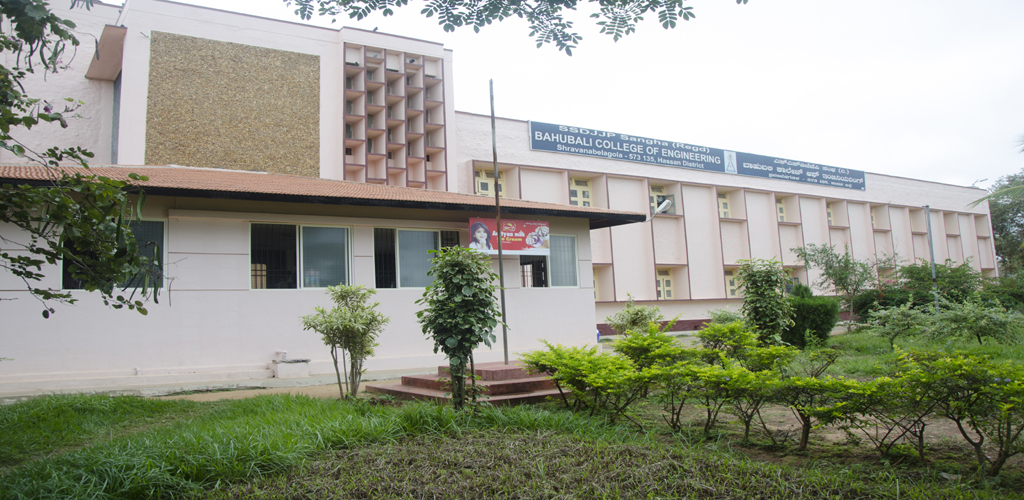About Department of Chemistry

Department of Chemistry in Bahubali college of Engineering came into existence in the year 1997. The department takes active participation in all the activities of the college.
- Proving outstanding teaching and quality training in Chemistry to all students at all levels and in all disciplines and also develop and maintain research programs of National and International relevance and serve the society through unique expertise and talent found in the department.
 will be uploaded soon.....
will be uploaded soon.....- PO1.Engineering knowledge: Apply the knowledge of mathematics, science, engineering fundamentals, and an engineering specialization to the solution of complex engineering problems.
- PO2.Problem analysis: Identify, formulate, research literature, and analyze complex engineering problems reaching substantiated conclusions using first principles of mathematics, natural sciences, and engineering sciences.
- PO3.Design/development of solutions: Design solutions for complex engineering problems and design system components or processes that meet the specified needs with appropriate consideration for the public health and safety, and the cultural, societal, and environmental considerations.
- PO4.Conduct investigations of complex problems: Use research-based knowledge and research methods including design of experiments, analysis and interpretation of data, and synthesis of the information to provide valid conclusions.
- PO5.Modern tool usage: Create, select, and apply appropriate techniques, resources, and modern engineering and IT tools including prediction and modeling to complex engineering activities with an understanding of the limitations.
- PO6.The engineer and society: Apply reasoning informed by the contextual knowledge to assess societal, health, safety, legal and cultural issues and the consequent responsibilities relevant to the professional engineering practice.
- PO7.Environment and sustainability: Understand the impact of the professional engineering solutions in societal and environmental contexts, and demonstrate the knowledge of, and need for sustainable development.
- PO8.Ethics: Apply ethical principles and commit to professional ethics and responsibilities and norms of the engineering practice.
- PO9.Individual and team work: Function effectively as an individual, and as a member or leader in diverse teams, and in multidisciplinary settings.
- PO10.Communication: Communicate effectively on complex engineering activities with the engineering community and with society at large, such as, being able to comprehend and write effective reports and design documentation, make effective presentations, and give and receive clear instructions.
- PO11.Project management and finance: Demonstrate knowledge and understanding of the engineering and management principles and apply these to one's own work, as a member and leader in a team, to manage projects and in multidisciplinary environments.
- PO12.Life-long learning: Recognize the need for, and have the preparation and ability to engage in independent and life-long learning in the broadest context of technological change.
About Department of Mathematics

Mathematics is the queen of all subjects. Day to day happenings cannot be imagined without Mathematics. For the Engineers it is an indispensable tool. Wherever there is any engineering application we will see application of engineering mathematics. Few people do that application part, others just enjoy the fruits of the work. Its application is everywhere, from the simple pillars of a house to the mighty hydroelectric dams, from a car on road to a satellite orbiting earth, weather predictions, financial markets, modeling any real life process, etc. Engineering mathematics is an interdisciplinary subject motivated by engineers' needs both for practical, theoretical and to deal with constraints to be effective in their work. The students have studied mathematics before (calculus, linear algebra, numerical analysis) but when they study engineering subjects which involve mathematics they often cannot relate mathematics to those subjects. Students can be motivated to understand their engineering problems better. Mathematics lecturers are encouraged to provide mathematics problems which are more related to engineering fields. The department came into existence in the year 1997 along with the institution itself to teach Mathematics for Mechanical Engineering, Industrial Production Engineering, Electronics and Telecommunication Engineering, Computer Science and Engineering students. Since then Mathematics was taught in the first two years (four semesters) of study. In the 2003 the department was clubbed with Physics, Chemistry, Civil, Electrical, English and Kannada and was called Basic Science and Allied Engineering Department. Again from 2016 the Departments were split and are now working independently. In 2005 Information Science and Engineering branch was started in the college and in 2010 PG course MEM was added in the institution. Along with the progress of the institution, the department of Mathematics also grew to its present condition consisting of two staff members one pursuing Ph.D. and one Assistant Professor.
- To make the students to gain the knowledge in new computer advancements to face new challenges by inculcating continuously evolving methods.
- To provide the students with a strong Mathematical foundation through the course which cater to the needs of industry, research and higher education.
- PEO1: to provide exposure to emerging technologies, adequate training and opportunities to work as teams on multidisciplinary projects with effective communication skills and leadership qualities.
- PEO2: students will develop professional skills that prepare them for immediate employment and for life-long learning in advanced areas of computer science and related fields.
- PEO3: Graduates will undertake research for professional career to meet the needs of the society.
- PEO4: Be an entrepreneur or employed in industry, government to demonstrate professional advancement through significant technical achievements with professional ethics and expanded leadership responsibility
- PO1.Engineering knowledge: Apply the knowledge of mathematics, science, engineering fundamentals, and an engineering specialization to the solution of complex engineering problems.
- PO2.Problem analysis: Identify, formulate, research literature, and analyze complex engineering problems reaching substantiated conclusions using first principles of mathematics, natural sciences, and engineering sciences.
- PO3.Design/development of solutions: Design solutions for complex engineering problems and design system components or processes that meet the specified needs with appropriate consideration for the public health and safety, and the cultural, societal, and environmental considerations.
- PO4.Conduct investigations of complex problems: Use research-based knowledge and research methods including design of experiments, analysis and interpretation of data, and synthesis of the information to provide valid conclusions.
- PO5.Modern tool usage: Create, select, and apply appropriate techniques, resources, and modern engineering and IT tools including prediction and modeling to complex engineering activities with an understanding of the limitations.
- PO6.The engineer and society: Apply reasoning informed by the contextual knowledge to assess societal, health, safety, legal and cultural issues and the consequent responsibilities relevant to the professional engineering practice.
- PO7.Environment and sustainability: Understand the impact of the professional engineering solutions in societal and environmental contexts, and demonstrate the knowledge of, and need for sustainable development.
- PO8.Ethics: Apply ethical principles and commit to professional ethics and responsibilities and norms of the engineering practice.
- PO9.Individual and team work: Function effectively as an individual, and as a member or leader in diverse teams, and in multidisciplinary settings.
- PO10.Communication: Communicate effectively on complex engineering activities with the engineering community and with society at large, such as, being able to comprehend and write effective reports and design documentation, make effective presentations, and give and receive clear instructions.
- PO11.Project management and finance: Demonstrate knowledge and understanding of the engineering and management principles and apply these to one's own work, as a member and leader in a team, to manage projects and in multidisciplinary environments.
- PO12.Life-long learning: Recognize the need for, and have the preparation and ability to engage in independent and life-long learning in the broadest context of technological change.
About Department of Physics

The Department of Physics was established in the year 1997 as a basic academic unit for all the engineering branches of the college. With a continuous infrastructure development since 1997, today the department is equipped with a well established lab catering to the needs of first year B.E. curriculum of Visvesvaraya Technological University, Belagavi, Karnataka. The department has two teaching faculties having doctoral degree from the institutes of national importance. There are two supporting staffs to assist the department activities. Faculties are involved in research in the fields of nanostructured magnetic materials, crystallography, materials science, and allied domain. The faculties have published more than 15 papers in international/national journals and presented about 25 papers in international/national conferences.
- To provide the fundamental knowledge of Physics to the students who would apply it in the thrust areas of Engineering.
- To provide intellectually stimulating environment for development of academic potential with emphasis on self-reliance and service to the society.
- PEO1: to provide exposure to emerging technologies, adequate training and opportunities to work as teams on multidisciplinary projects with effective communication skills and leadership qualities.
- PEO2: students will develop professional skills that prepare them for immediate employment and for life-long learning in advanced areas of computer science and related fields.
- PEO3: Graduates will undertake research for professional career to meet the needs of the society.
- PEO4: Be an entrepreneur or employed in industry, government to demonstrate professional advancement through significant technical achievements with professional ethics and expanded leadership responsibility
- PO1.Engineering knowledge: Apply the knowledge of mathematics, science, engineering fundamentals, and an engineering specialization to the solution of complex engineering problems.
- PO2.Problem analysis: Identify, formulate, research literature, and analyze complex engineering problems reaching substantiated conclusions using first principles of mathematics, natural sciences, and engineering sciences.
- PO3.Design/development of solutions: Design solutions for complex engineering problems and design system components or processes that meet the specified needs with appropriate consideration for the public health and safety, and the cultural, societal, and environmental considerations.
- PO4.Conduct investigations of complex problems: Use research-based knowledge and research methods including design of experiments, analysis and interpretation of data, and synthesis of the information to provide valid conclusions.
- PO5.Modern tool usage: Create, select, and apply appropriate techniques, resources, and modern engineering and IT tools including prediction and modeling to complex engineering activities with an understanding of the limitations.
- PO6.The engineer and society: Apply reasoning informed by the contextual knowledge to assess societal, health, safety, legal and cultural issues and the consequent responsibilities relevant to the professional engineering practice.
- PO7.Environment and sustainability: Understand the impact of the professional engineering solutions in societal and environmental contexts, and demonstrate the knowledge of, and need for sustainable development.
- PO8.Ethics: Apply ethical principles and commit to professional ethics and responsibilities and norms of the engineering practice.
- PO9.Individual and team work: Function effectively as an individual, and as a member or leader in diverse teams, and in multidisciplinary settings.
- PO10.Communication: Communicate effectively on complex engineering activities with the engineering community and with society at large, such as, being able to comprehend and write effective reports and design documentation, make effective presentations, and give and receive clear instructions.
- PO11.Project management and finance: Demonstrate knowledge and understanding of the engineering and management principles and apply these to one's own work, as a member and leader in a team, to manage projects and in multidisciplinary environments.
- PO12.Life-long learning: Recognize the need for, and have the preparation and ability to engage in independent and life-long learning in the broadest context of technological change.